In this article, we review the key dates and events of NY AG Schneiderman’s herbal supplements probe.
February 2, 2015
It begins!
NY AG Eric Schneiderman announces his probe with cease & desist letters to 4 major retailers. DNA tests found 79% of tested herbal products didn’t contain the labeled substance or contained other non-listed ingredients. Analytical experts and industry veterans were quick to slam the choice of DNA barcoding for botanical extracts.
We published an article with 10 questions we needed answered regarding the NY AG’s botanical action. Seven months on and we’re still waiting for answers to most of them.
February 4
There were loud calls for the testing data to be made public by the industry and various media outlets, which were not unreasonable given that this is an AG who once said, “Secrecy breeds corruption, while transparency generates confidence”. Such calls were rebuffed, however, with a spokesperson for the Office of the Attorney General telling us: "We will not be publishing the data for peer review. Our data is part of an ongoing investigation."
February 10
GNC reports results from re-tests on the product lots cited in the cease and desist letter for the first time. In a statement, GNC noted that the product lots in question were tested both during and after the production process and found to be pure and compliant prior to distribution. The company also subjected the products to retesting following the AG’s letter, and found that the products “are pure, properly labeled and in full compliance with all regulatory requirements”.
February 11
From label claims to structure function claims: The NY AG issued subpoenas to GNC, Walgreens, Target and Walmart demanding evidence to support the structure-function claims on their labels.
February 18
Senators Orrin Hatch, R-UT, and Martin Heinrich, D-NM, stepped in to the issue, sending a letter to then FDA Commissioner Margaret Hamburg to inquire about the DNA barcode testing that AG Schneiderman used as the scientific basis for his request.
The letter, which can be viewed on the NPA website, posed a number of questions for FDA, including is the Agency recognizes DNA barcoding for botanical extracts if it recommends the use of FDA barcoding.
February 23
Three weeks after those cease and desist letters to the four retailers, the NY AG’s office expanded the investigation to bring in four major supplement manufacturers: NBTY, Pharmavite, Nature's Way and Nutraceutical Corp. The AG’s office was demanding detailed ingredient and quality control information on every herbal supplement they sell in New York.
“As part of a broader investigation, NYAG is reviewing the sufficiency of the measures manufacturers and retailers are taking to independently assess the validity of their representations and advertising in connection with the sale of herbal supplements,” wrote Schneiderman in his letters to the companies.
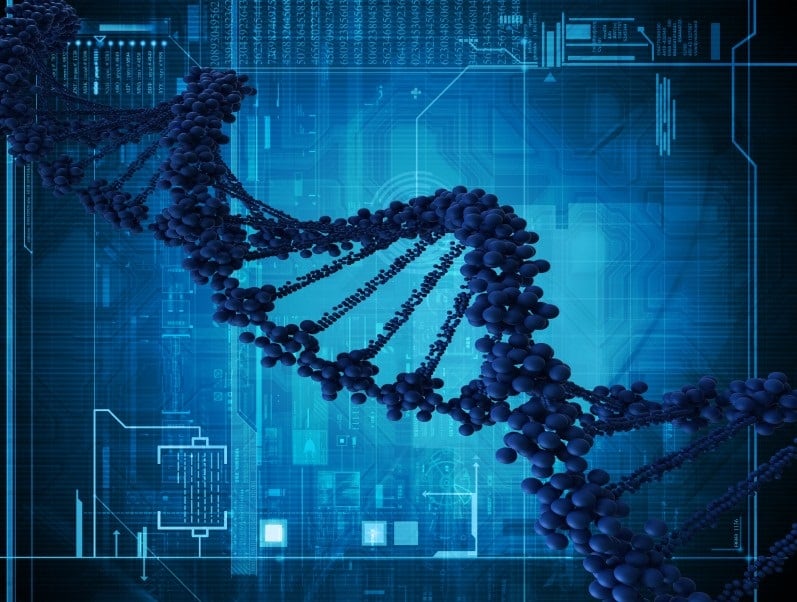
March 10
It was only a matter of time before other attorneys general joined in, and AGs from Connecticut, Indiana and Puerto Rico announced they had formed a coalition with AG Schneiderman, to “go further in investigating this industry and, as needed, in achieving reform.”
On the same day as the AG coalition was formed, GNC announced that, after four separate rounds of testing, its Herbal Plus product line meet all requirements for safety, quality, purity and proper labeling.
“This additional round of tests leaves no doubt that our products are not only pure but are in full compliance with all regulatory requirements,” said Michael Archbold, CEO of GNC, in a statement in early March.
March 12
A white paper commissioned by four trade associations representing the dietary supplement industry – the American Herbal Products Association (AHPA), the Consumer Healthcare Products Association (CHPA), the Council for Responsible Nutrition (CRN), and the United Natural Products Alliance (UNPA) – was released and concluded that the NY AG’s investigation into botanical supplements using DNA barcoding was a “...misuse of the technologies” that led to a “...misinterpretation of test results”.
The white paper can be accessed on the CRN's website HERE.
March 17
The Natural Products Association (NPA) also authored a white paper on 'DNA Barcoding for Botanical Authentication', which called for the AG's study data to be made publicly available, "to apply scientific scrutiny to the findings, provide validation to the results, or exonerate those companies undergoing current scrutiny.
"Scientific scrutiny of the test results is the only way to fairly adjudicate the allegations made and to prevent further actions by states to remove products, produced in accordance with federally opted GMP standards, from retailer shelves."
To access NPA's white paper, please click HERE.
March 30
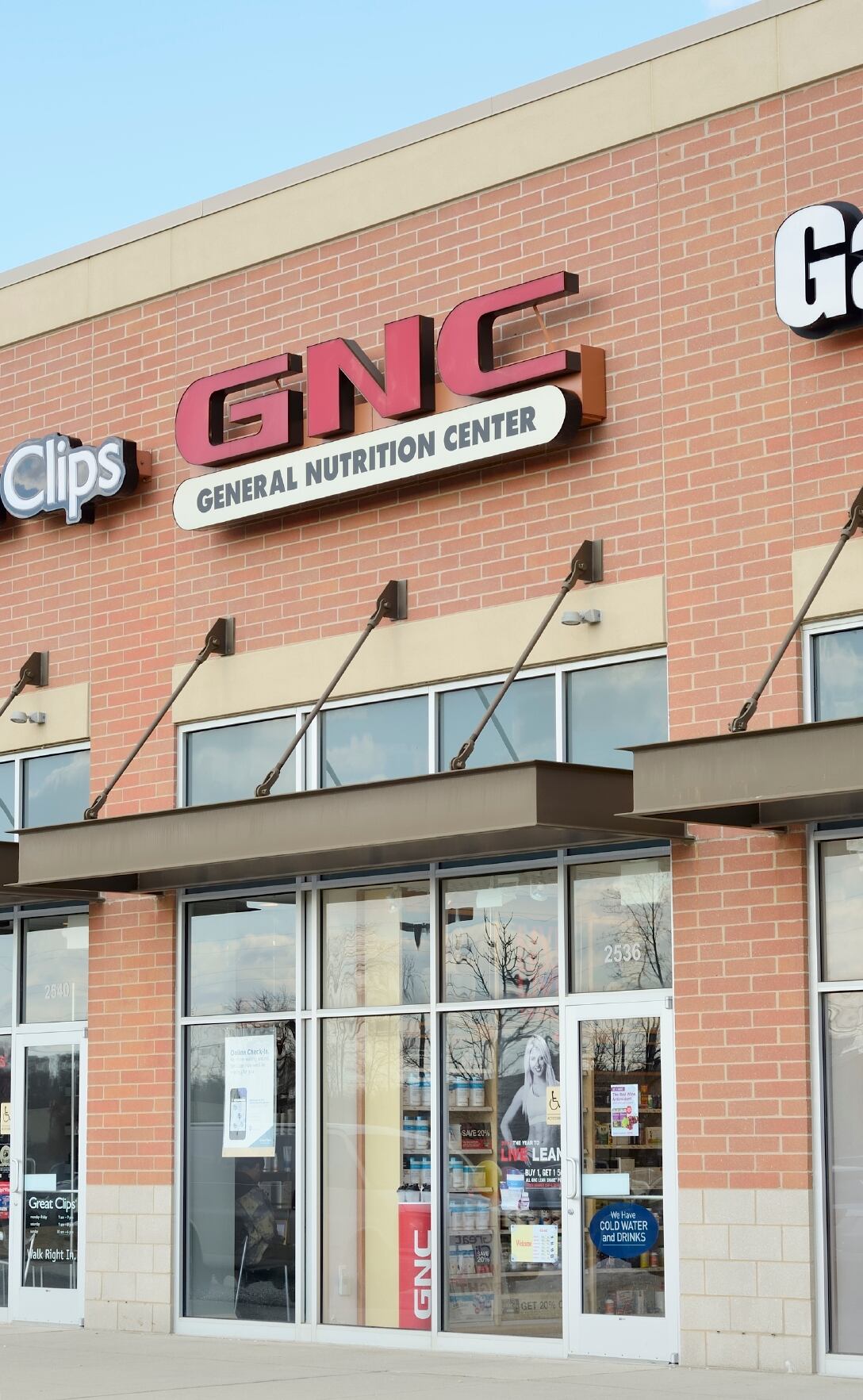
GNC and the NY AG reached an agreement to affirm that the company’s Herbal Plus products meet FDA GMP requirements and thus validate their quality. As part of the agreement, the company also agreed to a testing regimen that will be administered by the AG’s office and agreed to consumer-facing messaging in stores that more clearly explains the difference between herbal extracts and whole herb products.
The initial reaction from the industry was largely negative with some saying that the agreement served to validate the use of DNA barcoding.
April 2
AG Schneiderman and 13 other attorneys general sent a letter to members of Congress asking for an investigation of the herbal supplements industry and asking them to consider giving the FDA broadened enforcement powers over the industry.
The letter was addressed to Sen. Jerry Moran, R-KS, the chairman of the Senate Commerce subcommittee responsible for consumer protection issues, Rep. Joe Pitts, R-PA, chairman of the House Energy and Commerce health subcommittee, and other lawmakers.
April 9
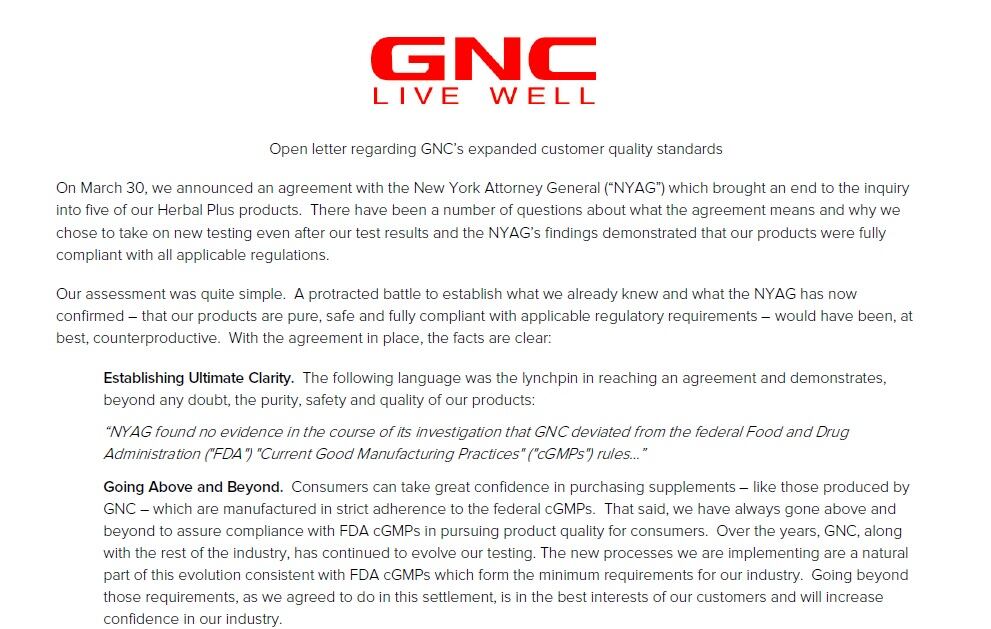
In response to the reaction from industry, GNC CEO Mike Archbold penned an open letter to the industry to explain the supplement giant’s agreement with the NY AG.
“Our assessment was quite simple,” he wrote. “A protracted battle to establish what we already knew and what the NYAG has now confirmed – that our products are pure, safe and fully compliant with applicable regulatory requirements – would have been, at best, counterproductive.”#
Regarding DNA barcode testing, Archbold wrote: “Even noted critics of our industry agree that the use of DNA barcode testing on finished extract products – as performed by the NYAG – is not appropriate. However, DNA barcode testing may someday play a role in the identity testing of some source materials earlier in the production process […] GNC has agreed to devote resources to advance this new technology in a scientifically valid way.”
The full letter can be read here:
April 12
The FDA had remained quiet throughout the first two months of the investigation, but that changed during a session of the Oxford International Conference on the Science of Botanicals in Mississippi.
If it results in a stronger, more compliant industry, then the FDA is supportive of activities such as those undertaken by the NY AG, said Cara Welch, PhD, acting director of the Division of Dietary Supplement Programs at FDA’s Center for Food, Safety and Nutrition.
“We know there is a GMP problem out in the industry. So in that respect we are very interested in every aspect of cleaning up the industry, whether it is from industry self-regulation, whether that is from the states themselves or whether that is from FDA,” Welch told the meeting attendees.
Welch emphasized that FDA was not privy to the NY AG’s actions.
“We are not part of the NY AG investigation. They didn't tell us. They did tell the press, obviously. But the GMP standards are minimal standards. Anything over and above that industry might want to set up, or the states might want to undertake, if it strengthens the industry we are all for that,” she said.
April 15
Organic and Natural Health Association becomes the first trade association to meet with the NY AG’s office. During the meeting, ONHA called for FDA’s current GMPs (code 21 CFR Part 111) to be applied to raw material manufacturers.
“Our meeting was encouraging as it is clear we have common goals that revolve around ensuring consumers are purchasing products that can be verified for quality ingredients at the earliest possible point in the manufacturing process,” said Karen Howard, CEO and executive director of Organic & Natural.
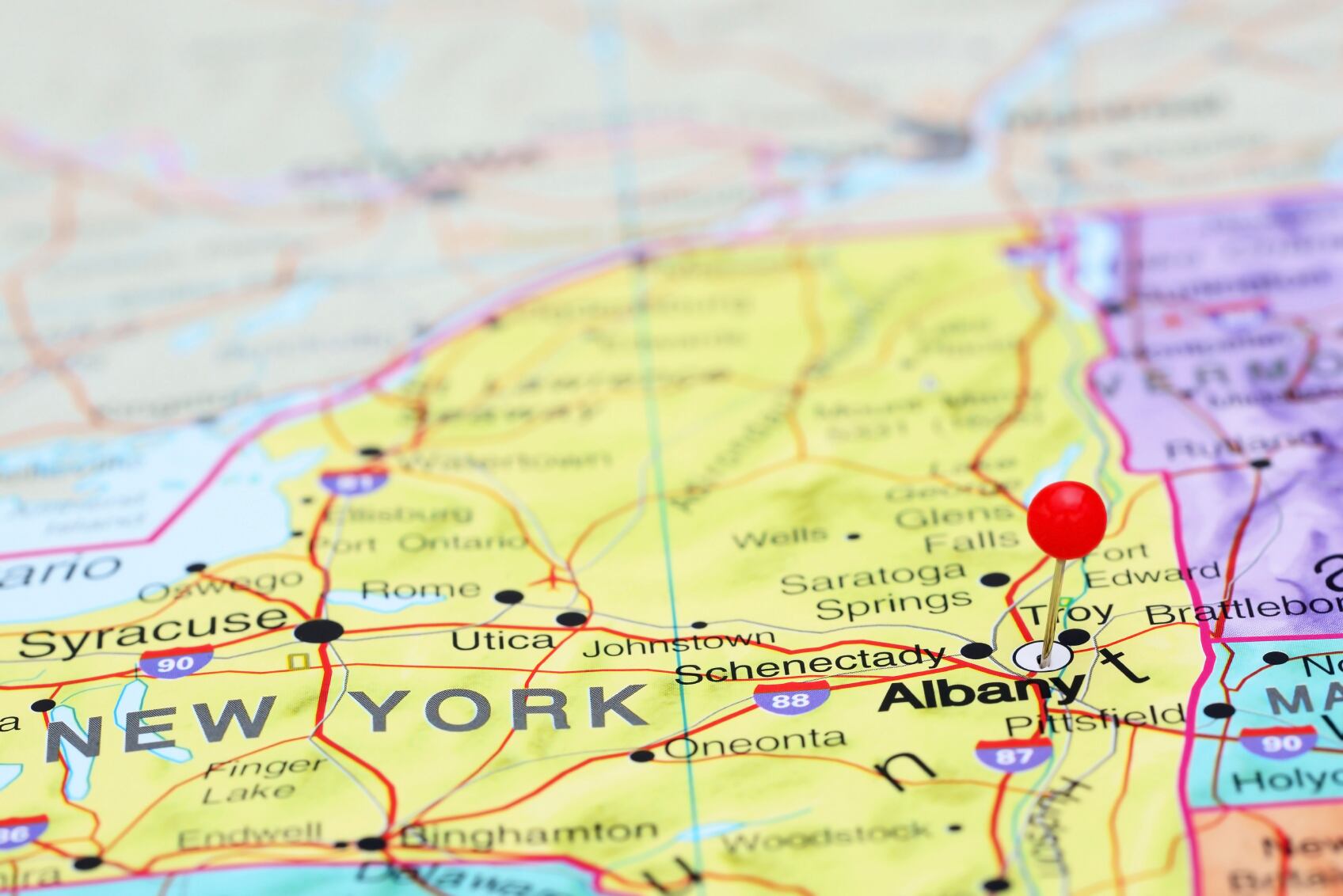
May 11
The Natural Products Association was the next to make an announcement following a meeting with the NY AG’s office. The joint statement from AG Schneiderman and NPA CEO Daniel Fabricant, PhD, was the first indication that there was an admission that the DNA barcoding was not definite.
The statement said that “no single test or technology alone can provide complete confidence to consumers, we support the application of DNA barcoding technology as part of a multi-faceted approach to assuring authenticity and identifying substitution.”
The statement went on to say that this approach should be used “prior to extraction,” which was interpreted by some industry sources as a backhand admission on Schneiderman’s part that the technology was inappropriately applied in his initial round of testing on finished herbal dietary supplements.
May 28
Nature’s Way, one of the manufacturers pulled into the investigation on February 23, told NutraIngredients-USA that it had proactively responded to the investigation by initiating a new and more rigorous plant-to-powder supply chain management structure.
Travis Borchardt, vice president of regulatory affairs and QA/QC at Nature’s Way, told us: “We thought, why don’t we also use this an opportunity to pull the supply chain together and make it consistent across the board to use a botanical ID approach and start with the plant when it’s in the ground.”
May 26
AG Schneiderman and IN AG Greg Zoeller were back working together on a letter to Dr Stephen Ostroff, FDA’s acting commissioner, at the end of May, urging an “overhaul federal oversight of the dietary supplements industry”.
The attorneys general also urged the FDA to “swiftly act” on the citizen petition the Organic and Natural Health Association to extend the cGMPs (code 21 CFR Part 111) to raw material manufacturers.
“There’s no need to wait for Congressional action to drastically improve federal oversight of the dietary supplement industry,” said AG Schneiderman in a statement. “The FDA has the authority to rewrite the rules that govern the multibillion-dollar dietary supplement industry today.
“The health and safety of the tens of millions of Americans who take supplements every single day will continue to be jeopardized until these lax regulations are improved. I urge the FDA to use every tool at its disposal to protect consumers in New York and across the country from the unnecessary risk of tainted supplements.”
June 10
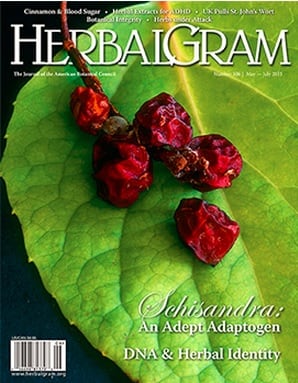
The American Botanical Council released an in-depth look at the history and implications of the New York Attorney General affair on the organization’s website. The 9,500-word article, containing 71 references, was the most detailed look at the situation to date.
That report, published in HerbalGram 106, can be accessed HERE (subscription required).
August 3
Six months after the launch of the NY AG’s campaign we were wondering if there had been any impact of the NY AG's actions on overall herbal supplement sales… Data from SPINS indicated that sales of herbal formula supplements were up almost 13% compared to the same time last year. Sales for the current 52 weeks ending July 12, 2015 were $687 million, up 12.6% compared to the 52 weeks ending July 12, 2014 ($610 million) for herbal formulas.
Sales for herbal formulas showed double digit growth over last year for every four week period this year, with May, June, and July 2015 showing increases of over 25% compared to last year (see figure below). The picture was not as rosy for single herb supplements, but the data still showed relatively stable performance.
"This data certainly counters fears of a precipitous decline," Michael McGuffin, president of the American Herbal Products Association (AHPA) told us.
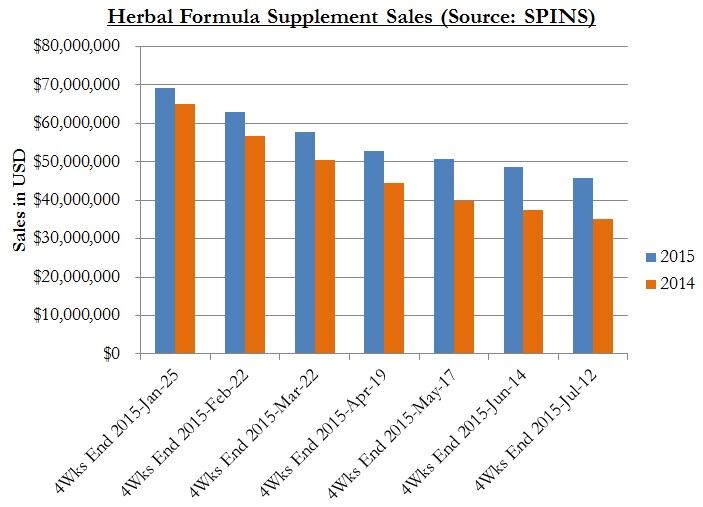
September 9
After a relatively quiet summer, the NY AG gaze shifted back to the herbal supplement sector with cease and desist letters being sent to 13 companies marketing devil’s claw supplements claiming the products fraudulently mixed one species of the botanical with a closely related species.
Herbal experts, however, were quick to state that this is a non-issue and that using the two species interchangeably has long been an officially accepted practice.
Harpagophytum procumbens is listed as the only species of “devil’s claw” in AHPA’s Herbs of Commerce, which has been accepted as authoritative by the FDA. However, veteran herbalists regard Harpagophytum zeyheri as substantially equivalent and comparable.
“Virtually all of the official herbal medicines made in the European Union are made from a mix of procumbens and zeyheri,” Roy Upton, executive director of the American Herbal Pharmacopoeia, told us.
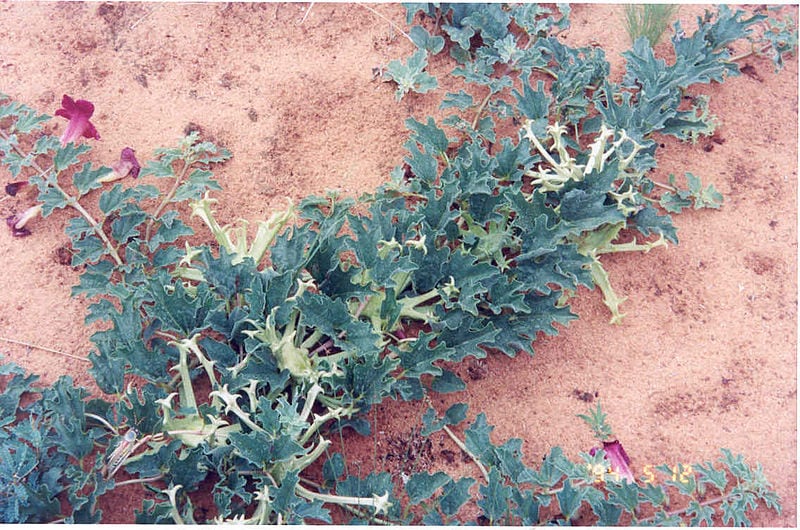
…
To be continued…
We will continue to update this timeline as events unfold.

